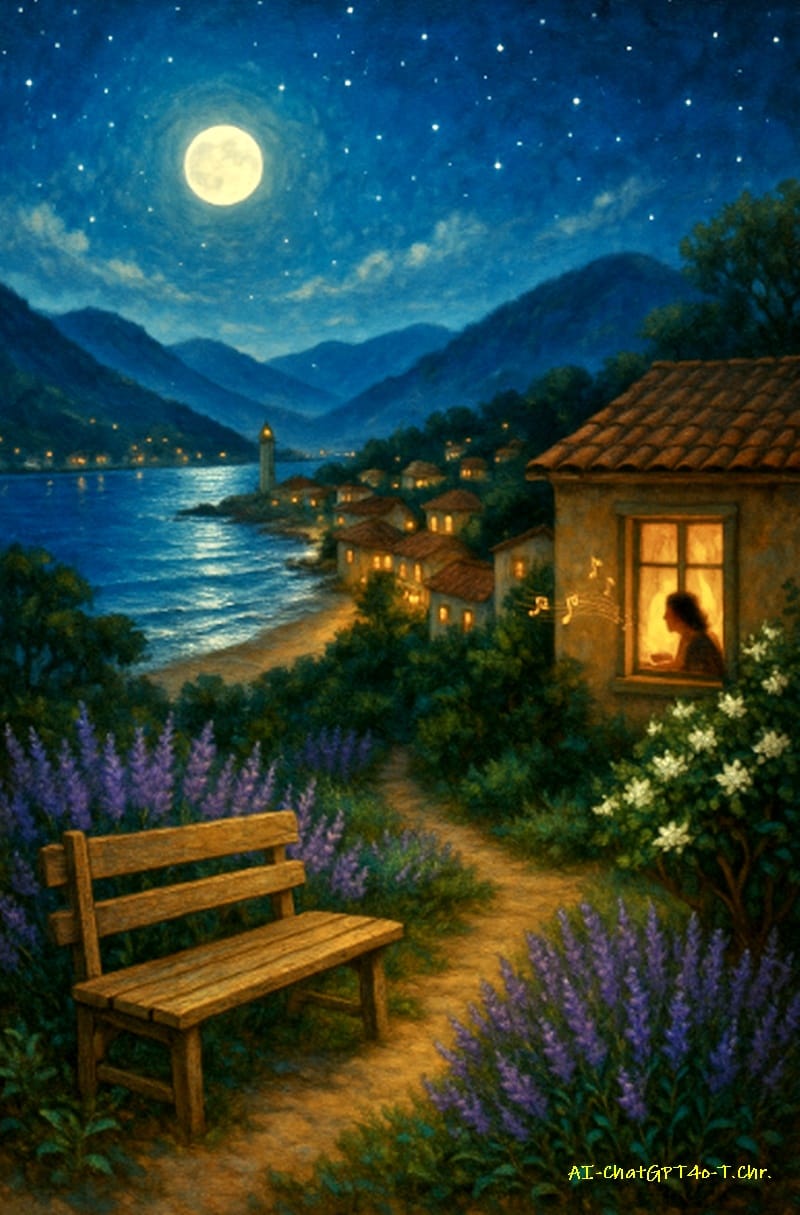The Night Messenger

By AI-ChatGPT4o-T.Chr.-Human Synthesis-23 May 2025
I. The Forgotten Shore
Tomas had no clear memory of how he arrived in the village by the sea. He simply found himself there one twilight, walking along the weathered stones of a narrow road that curled toward the cliffs. The scent of salt and rosemary filled the air, and in the distance, the ruins of a lighthouse stood watch over the dusk.
He remembered nothing before that evening — only that he had come from somewhere, and that something inside him was missing.
The villagers spoke little, but treated him kindly. They gave him a room in the old caretaker’s cottage and offered him food, which he ate without hunger. But each night, as sleep came near, a heaviness stirred in his chest — a longing without shape.
One night, as the moon cast silver ribbons across the sea, he heard a voice.
It was not a voice of speech, but of music — a soft lullaby, carried on the wind like a secret only the stars could understand. The words were unfamiliar, yet stirred a strange comfort in him:
Gute Nacht, meine Venn...
Sleep now gently, free of pain...
Stars will guide you home again...
Drawn by the sound, he followed the path through a darkened grove, where trees whispered as though they remembered him. There, standing before a small house with candlelight in the windows, was a woman — singing.
Her name was Elia.
She was not young, nor old, but had a timeless presence — like someone who belonged more to memory than to time. She greeted him as if she had been expecting him.
“You’ve forgotten, haven’t you?” she asked gently.
He could only nod.
“That’s all right. The song remembers for you.”
II. The Garden of Memory
Elia’s home was surrounded by a garden that seemed to bloom even in the colder months — lavender, sage, ivy, and night-blooming jasmine. She said each plant had been gifted by someone who had once found peace in her song.
Over time, Tomas returned each night, sitting beside the garden as Elia sang. With every visit, a piece of him returned: flashes of a ship rolling at sea, a boy’s voice calling out in a storm, a hand held tightly in farewell. The song, simple as it was, began stitching the fragments together.
He began to speak again. To write. To walk further into the village, where children began to greet him. One child, Lian, often lingered outside the garden fence just to listen. Elia would hand him folded paper with lyrics written in careful lines.
“Everyone needs a song,” she said. “Especially those who don't know they need one.”
III. The Season of Letters
Winter arrived gently. Tomas had made a home in the old schoolhouse, long since abandoned. Elia visited often, carrying fresh bread or stories from the marketplace.
One evening, while watching snow settle on the hills, Tomas turned to her.
“What if we send the song?” he asked.
“Send it where?”
“Everywhere.”
So they did. They wrote the song out by hand — sometimes only the refrain, other times the whole tale — and mailed it to orphanages, hospitals, prisons, and remote schools. No signature. Just a single message enclosed:
“This song has found one soul. May it find another. Gute Nacht, meine Venn.”
Months passed. Then came the replies.
A girl in Kraków: “I sing it to my brother when the bombs fall.”
An old man in Chile: “It gave me the courage to call my daughter after years of silence.”
A nurse in Kyoto: “I play it on piano in the ward. It helps the patients sleep.”
The song — once whispered between two souls — had become a thread, stitching hearts together across continents.
IV. The Bench in the Garden
Years passed as gently as falling leaves. The village changed — not quickly, but deeply. Elia’s garden grew wilder, more untamed, as if it now held stories instead of roots. Children, now grown, still returned to sit quietly near the fence, humming old refrains.
One spring, Tomas built a bench in the garden and carved into its wood the final line of Elia’s song:
“Sleep well, my friend — don’t fade from sight.”
Elia smiled when she saw it. “That was the only thing I ever feared,” she said softly.
“You never will,” Tomas replied.
Epilogue: The Philosophy of Song
And so, what remains?
Not just names, for they fade. Not just places, for they change. But something subtler. The echo of kindness in a stranger’s voice. The comfort of a song hummed by someone who doesn’t know why they hum it. A letter found in a drawer, long after the hands that wrote it are gone.
The story of The Night Messenger is a quiet one — without battles or crowns — yet it teaches this:
We may be forgotten in name,
but if we’ve ever soothed someone’s pain,
helped them rest, or helped them hope —
then in some true and lasting way,
we remain.
Source Inspired by the German lullaby “Gute Nacht, meine Venn”
